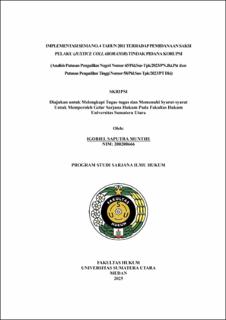Implementasi Sema No. 4 Tahun 2011 Terhadap Pemidanaan Saksi Pelaku (Justice Collaborator) Tindak Pidana Korupsi (Analisis Putusan Pengadilan Negeri Nomor 65/Pid.Sus-Tpk/2023/PN.Jkt.Pst dan Putusan Pengadilan Tinggi Nomor 58/Pid.Sus-Tpk/2023/PT Dki)
Implementation of Sema No. 4 Of 2011 on Criminal Punishment of Justice Collaborators in Corruption Criminal Acts (Analysis of District Court Decision Number 65/Pid.Sus-Tpk/2023/PN.Jkt.Pst and High Court Decision Number 58/Pid.Sus-Tpk/2023/PT Dki)

Date
2025Author
Munthe, Igobiel Saputra
Advisor(s)
Lubis, Rafiqoh
Alsa, Abdul Aziz
Metadata
Show full item recordAbstract
Corruption is categorized as an extraordinary crime because it is carried
out systematically, complexly and planned by state officials. As time goes by, ti
uncoer cases of criminal acts of corruption, investigators often collaborate with
perpetrators who are used as witnesses to provide information and fact regarding
the corruption incidents that occurred. Witnesses who know directly and are
directly involved in the case and dare to reveal the incident are called Justice
Collaborator.
The problems of this thesis are how to regulate criminal acts of corruption
according to Indonesian criminal law, what is the role of the Justice Collaborator
in criminal acts of corruption, how is the punishment of the Justice Collaborator
in the Central Jakarta Distrik Court Decision Number 65/Pid.Sus
Tpk/2023/Pn.Jkt.Pst and Jakarta High Court Decision Number 58/Pid.Sus
Tpk/2023/Pt.Dki from a SEMA perspective number 4 of 2011. This research is
descriptive in nature using normative legal research methods with a statutory
approach and a case approach, the data used is secondary data through library
study data collection techniques with qualitative analysis methods.
The results of this research are that criminal acts of corruption are
Regulated In The Criminal Code (KUHP), as well as Regulated In Law Number
20 Of 2001 Concerning Amendements To Law Number 31 Of 1999 Concerning
The Eradication Of Corruption Crimes. In terms of the role of the Justice
Collaborator in disclosing criminal acts of corruption, it is to provide information
to law enforcement officials through testimony in the judicial process. Defferences
in the judge‟s considerations in sentencing in Decision Number 65.Pid.Sus
Tpk/2023/Pn.Jkt.Pst, where the panel of the judges in their considerations rejected
the defendant‟s application as a witness to the perpetrator (Justice Collaborator).
The panel of judges did not consider that criminal acts of corruption are
organized crime, which law enforcers often experience when exposed. Meanwhile,
in Decision Number 58/Pid.Sus-Tpk/2023/Pt.Dki, the judge reconsidered the
defendant as a Justice Collaborator, where the judge, guided by SEMA
regulations, appreciated or rewarded the defendant‟s testimony by giving the
defendant a reduced prison sentence.
Collections
- Undergraduate Theses [3142]
